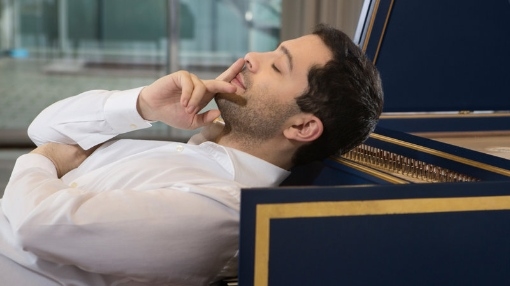Mahan Esfahani, an absolute world leader in harpsichord playing, is coming to Brno. He was the first and only harpsichordist in the world to win the BBC's New Generation Artist in 2008-2010 and has won countless prestigious music awards. He will perform with the Brno Philharmonic Orchestra in a programme entitled Mahan Esfahani: harpsichord in the main role.
“The harpsichord will be featured in each piece of the evening, each time in a different role, first as the leading voice of a larger chamber orchestra, then as a solo instrument accompanied by a symphony orchestra and finally in a concertante part," stated Marie Kučerová, Director of the Brno Philharmonic.
The evening will open with Chamber Music for Harpsichord and Seven Instruments by Hans Krása, whose chamber music, as critics of the time noted, combines the old with the new, the serious with the banal, the sober with the sentimental. “It consists of two contrasting movements, one of which is motoric and virtuosic in nature, working mainly with playful themes, while the other is variable," commented Vítězslav Mikeš, Dramaturge of the Brno Philharmonic, adding that the harpsichord will be accompanied by four clarinets, a trumpet, a cello and a double bass. The concert will take place on Thursday and Friday, 22 and 23 February 2024, at 7:00 p.m. on both nights in Besední dům.
“I wanted to use the harpsichord so that it sounds French and modern, not like some kind of pastiche. I wanted to show that it is not an obsolete, ineffective instrument that has only historical significance," said Francis Poulenc of his composition Concert champêtre (Country Concert). The orchestra's scoring, which seems to be oversized given the limited dynamic possibilities of the harpsichord, corresponds to this intention. “Poulenc, however, as an excellent composer with a clear idea of sound and instrumentation, knew why he decided to make this apparent disproportion: from the dialogue between the solo instrument and the orchestra, from the contrast of quiet and delicate, or rather opulent sound, he extracted a spirited tension that makes the Country Concert a truly unique work," added Mikeš.
The second half of the evening will feature Mieczysław Weinberg's exceptionally powerful and impressive Symphony No. 7. The work of the artist known as "Shostakovich, but without the smile" has only begun to be discovered and appreciated globally in recent years. His symphony is conceived as a baroque concerto grosso filled with topical content and based on a dialogue between the string orchestra and the harpsichord concerto. “It is difficult to judge whether the symphony has any hidden extra-musical content, as was common among anti-regime Soviet composers. All the more surprising is the final Allegro, which is almost directly descriptive: in the harpsichord's toccata-like run one cannot help but hear the threat of the ringing telephone, a symbol of the dark Stalinist times," Mikeš noted.
Mahan Esfahani will play the concert on an Ammer Philharmonic harpsichord. “It is an excellent German instrument from the 1980s. Later on, production shifted to replicas of old instruments that sound different and are more suitable for music of earlier periods, so ours is becoming quite rare," Kučerová pointed out.













No comment added yet..